The #RenewTN movement proved that it is growing –– as the largest crowd yet to assemble in the Knoxville mayoral campaign gathered to hear candidates’ plans on addressing energy issues that affect all Knoxvillians. Laura Humphrey, former Energy Policy Associate at the Southern Alliance for Clean Energy also contributed to this blog.
Kate Tracy and Maggie Shober | July 31, 2019 | Elections, Energy Justice, Energy Policy, TennesseeWatch and share the full video of the mayoral energy forum held on July 29th, 2019 here. You can view the slide deck that accompanied the forum questions here.
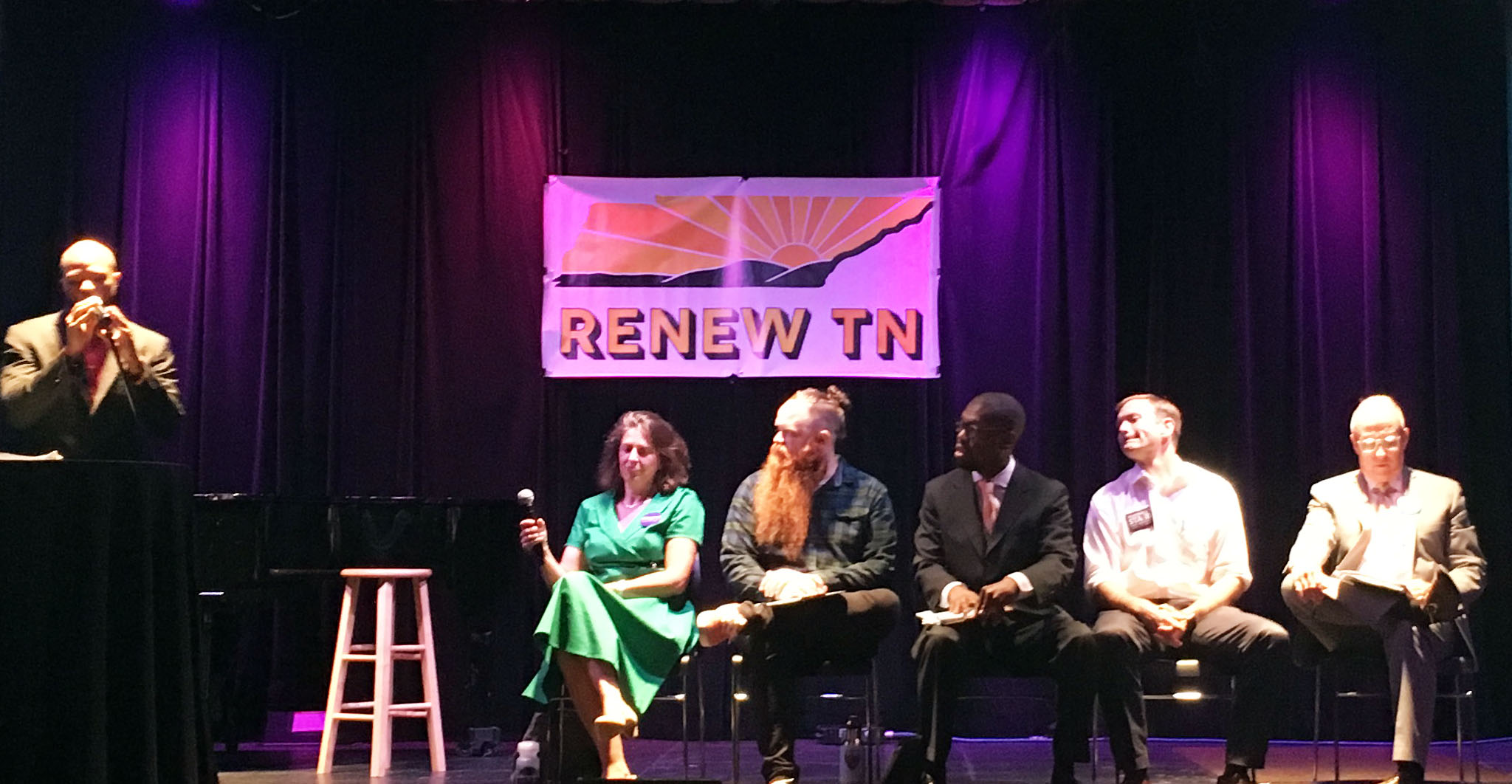
Energy is a hot issue in Knoxville’s 2019 city elections. This past Monday, five of the six Knoxville mayoral candidates answered questions from moderator André Canty of the Highlander Research and Education Center in front of a crowd of over two hundred. The discussion ranged across the candidates’ plans to address high energy burdens in the city, how to meet Knoxville’s proposed climate goals, and negotiating with the local and regional public power providers, Knoxville Utilities Board (KUB) and the Tennessee Valley Authority (TVA).
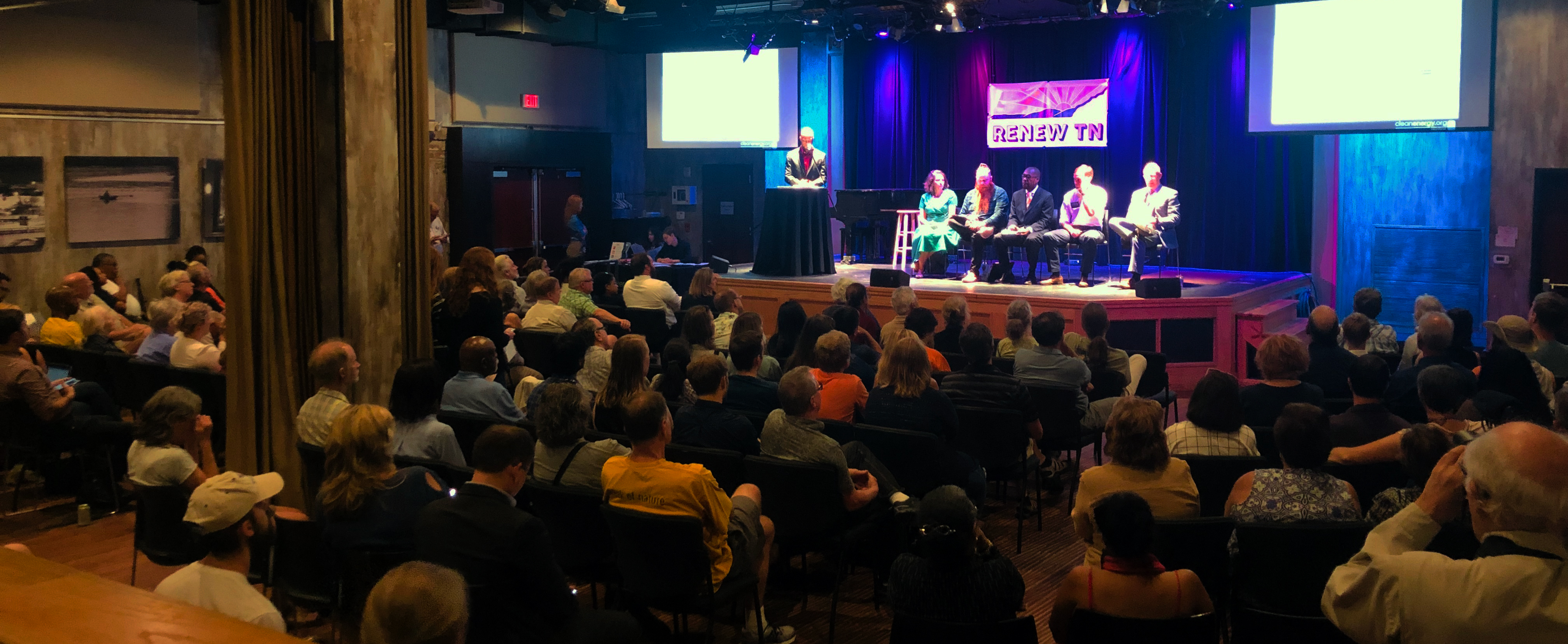
Progress on energy is a priority for Knoxville
Two forum questions addressed the issue of high energy burdens, or portion of income spent on energy, prevalent in Knoxville’s low-income and minority communities and worsened by high fixed fees on KUB electric bills. Candidates discussed approaches to work with KUB to bring down fixed fees and incentivize weatherization and energy savings measures for customers most in need. Mayoral candidates Fletcher Burkhardt, Indya Kincannon, Eddie Mannis, Calvin Skinner, and Marshall Stair appeared to find common ground on these issues.
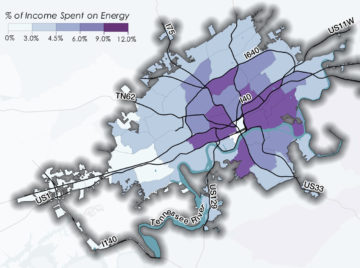
Candidates acknowledged the $19 and soon to be $20.50 monthly mandatory fixed fee or “basic customer charge” on electric bills, which KUB claims helps pay for infrastructure upgrades, disproportionately impacts low-income and fixed income users and puts our most vulnerable communities at risk, which Burkhardt summed up as “unacceptable.” Skinner stated that “KUB Board knows the fixed fees are too damn high, TVA knows the fixed fees are too damn high,” and that “it’s time for us to act.”
Stair explained the impact, stating that, “[A fixed fee] doesn’t incentivize weatherization. If most of your bill is fixed costs, it doesn’t matter how much energy you consume.” Many candidate comments echoed sentiments from the SEEED forum where, just days before, “unaffordable utilities” was highlighted as one of the top three issues Knoxvillians face.
Kincannon stated she “opposes regressive fixed rates,” and pointed out that “better ways to finance fixed costs are being done in other cities and KUB knows there are other ways.” She stated a desire to work with KUB to find a revenue neutral way to work on a “KEEM 2.0.” The Knoxville Extreme Energy Makeover (KEEM) was a program that ended in 2017 where TVA provided $15 million to weatherize low-income homes in Knoxville. TVA funding for weatherization and other energy savings programs has since plummeted.
The five candidates supported energy efficiency as one of the best solutions to relieve energy burdens, but recognized the high fixed fee isn’t conducive to lowering household energy costs and incentivizing energy efficiency upgrades in homes that will lower energy consumption, reduce carbon emissions, and make homes and communities healthier.
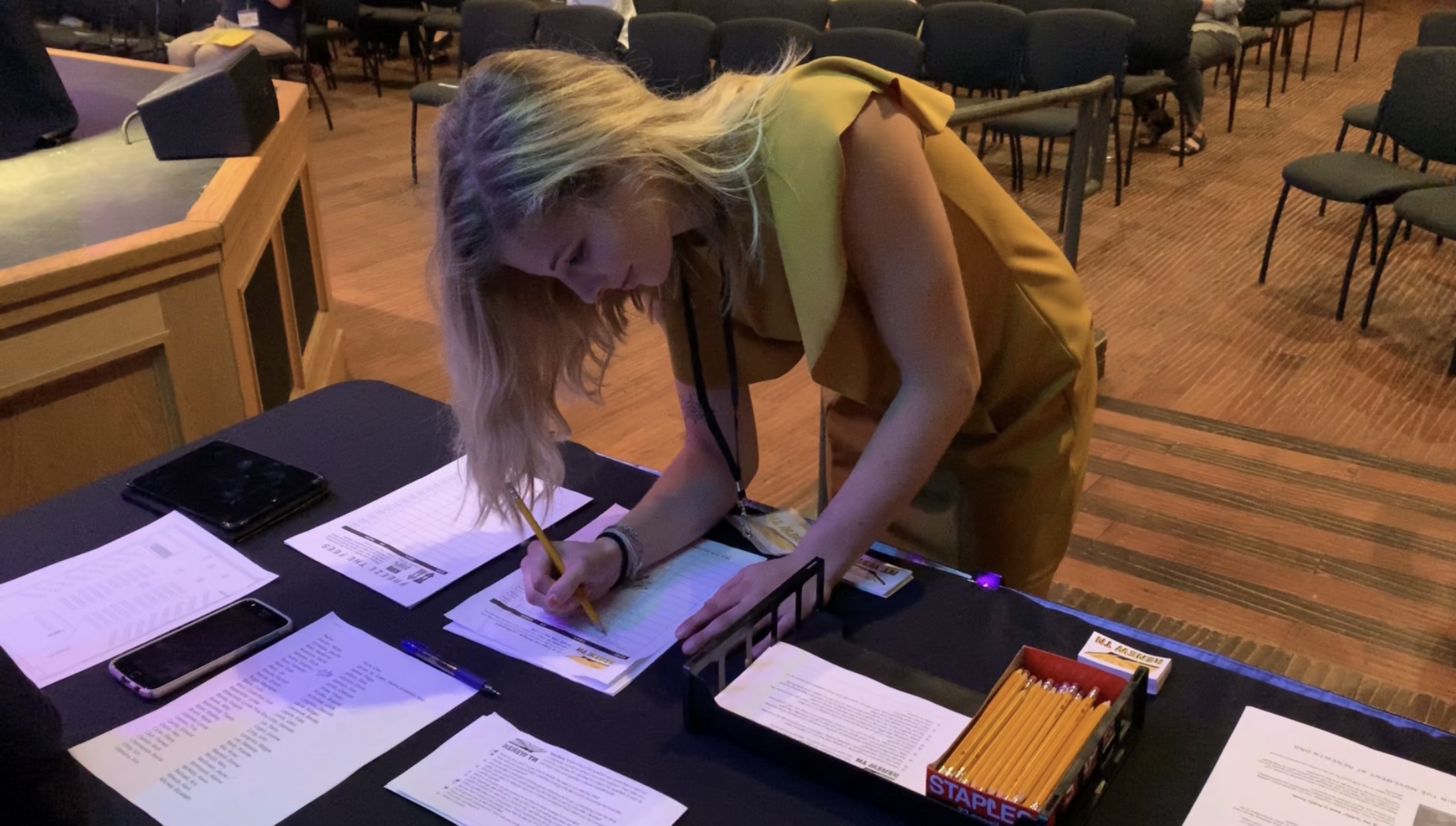
Knoxvillians’ questions draw out candidate positions
The first round of forum questions were selected based on online feedback from #RenewTN supporters; the second half of the Q&A featured questions from the packed audience.
Positions on Knoxville climate goals
Alex Carter, Knoxville resident and incoming freshman at UT-Knoxville, recently turned 18, registered to vote, and is a self-described “clean energy voter.” Carter asked on behalf of her generation if Knoxville’s proposed climate goals were ambitious enough to meet the level of the crisis.
Answers from mayoral candidates ranged from optimistic to pragmatic. Skinner, Burkhardt, and Kincannon expressed interest in doing more. Mannis articulated satisfaction with the current goals stating they were a “milestone,” while Kincannon expressed that the goal for the community could be more ambitious (the current proposal does not include a community goal until 2050). Stair, a current City Councilmember who will vote on the proposed goals August 13, stated that he feels the goals are ambitious. He pointed to the upcoming challenge of implementation and called for collaboration from individuals, businesses, and every level of government to achieve the proposed climate goals.
Candidates were also asked how they would develop a plan to achieve the proposed climate goals. Skinner stated he would start working on it within the first 30 days as mayor and tap into groups already working on addressing this “moral crisis.” Several candidates proposed measures like switching to electric buses, encouraging walkability and bike trips, and reducing energy use of city buildings.
Positions on TVA
The Tennessee Valley Authority (TVA), a federal entity, supplies all of the electricity distributed by KUB to residential customers, businesses, and city operations. TVA decisions have a major impact on energy consumption and costs in Knoxville, though neither the city nor the state of Tennessee has direct regulatory authority over those decisions. TVA has recently moved away from cost-saving energy efficiency programs and low-cost, clean, solar energy.
Candidates were asked what past experiences prepared them to work with TVA when appropriate and stand up to TVA when necessary. Skinner emphasized his civil rights activism that prepared him to speak up for all communities. He went on to say, “We need to leverage who we are as a city…Knoxville & KUB are one of the largest customers to TVA.” Stair lamented TVA’s disappointing direction on solar energy, while Burkhardt highlighted how his business negotiation experience prepared him to tell TVA “either you do it or we do it.” Kincannon promised to use the mayor’s “bully pulpit” to push TVA. Alternatively, Mannis stressed the “bully pulpit” as a last resort and instead would build and leverage strategic partnerships.
Positions on KUB Board
The mayor of Knoxville has a key role in selecting candidates to sit on KUB’s regulating body, the KUB Board of Directors. Candidates were asked what qualifications to expect from nominees to sit on the KUB Board. All candidates stressed the importance of the KUB Board representing all of Knoxville’s communities. Kincannon suggested at least one member be someone who has “experienced getting one of those pink slips” for utility disconnection. Mannis asked for greater public participation in the nomination process, particularly by attending City Council meetings where nominations are approved.
Audience-guided questions for the mayoral candidates also covered:
- Electric vehicles and transportation (56:11)
- Access to solar energy after TVA cancels residential solar program (37:20)
- Changes to the City Charter governing the relationship between KUB and the city (1:11:15).
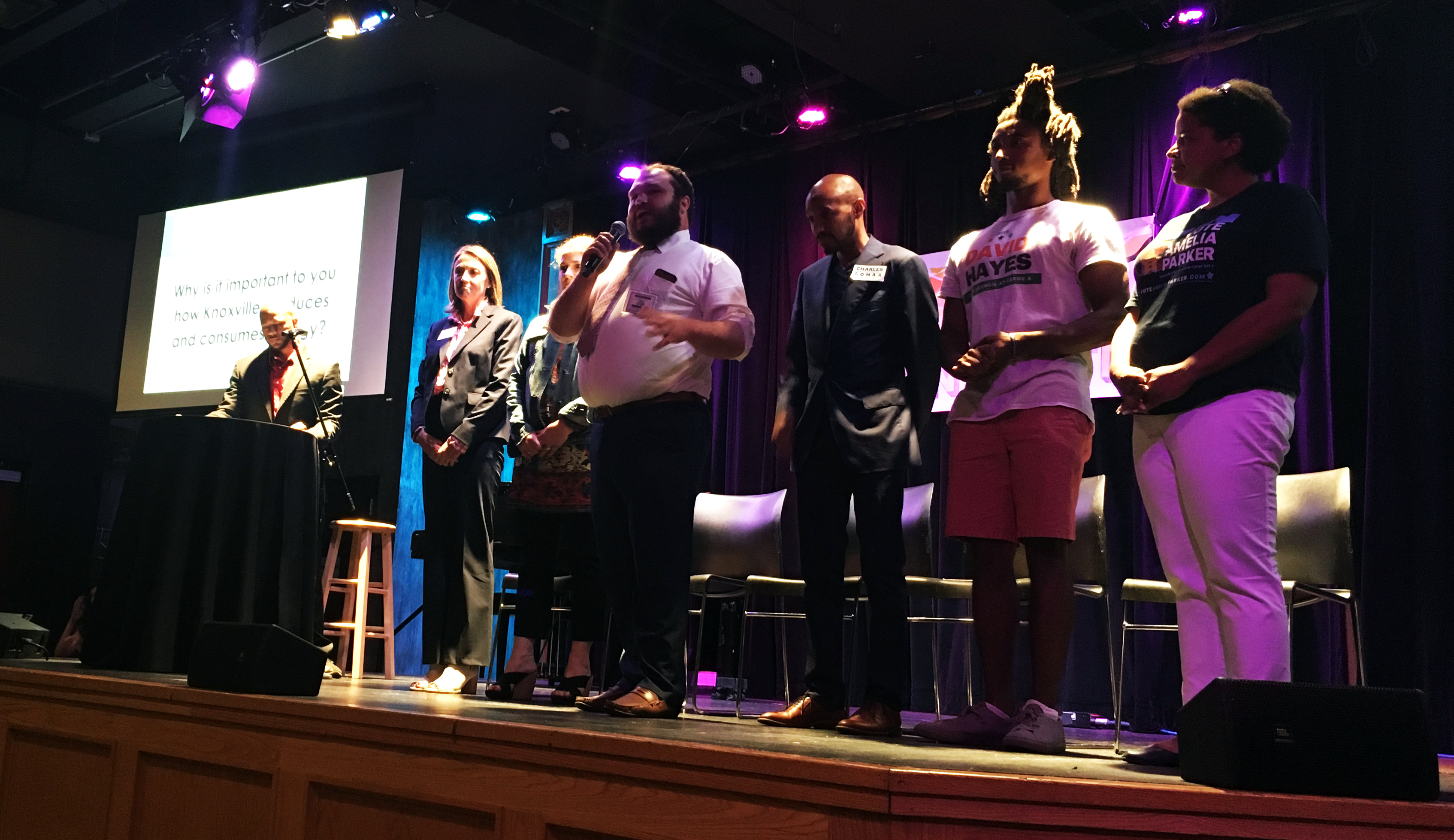
City Council candidates show up to #RenewTN
Before the mayoral candidates took the stage, city council candidates Charles Al-Bawi, David Hayes, Charles Lomax, Amy Midis, Amelia Parker, and Janet Testerman let the packed crowd know why it is important to them how Knoxville produces and consumes energy.
Charles Lomax stated, “Time is of the essence, we are in crunch time. If we don’t decide now to have renewable and sustainable energy, we are jeopardizing our environment, our country, our planet, for ours and future generations to come. We have to make the choice now. We need to make sure we are doing everything in our power, not in the future, right now, to make sure we have clean and renewable energy.”
Charles Al-Bawi and Amelia Parker outlined two reasons why it’s important: social justice and fiscal responsibility. Al-Bawi stated, “if we choose renewable energy sources instead of non-renewable ones, we save the environment, less resource depletion, less pollution, less greenhouse gases, but also we save cost savings in our energy bills and we create jobs.” Amelia Parker helped lay the foundation for the KEEM program in Knoxville and based on that experience says there is a need to “look at the impact on our low income residents,” while investing in a green economy “because you always make your money back [on your investments] from the savings you make.”
Long-time climate justice advocate David Hayes wants to “make sure the great [proposed climate] goals we have for our city are bolder and we need everybody to be involved.” He also extended an offer to individuals and organizations to join him in developing a climate platform for his campaign.
City council candidates Testerman and Midis pointed out the need to take into account the impact of our energy choices in order to protect Knoxville’s landscapes. Testerman noted she has worked with local organizations to, “preserve the beauty of the natural area.” Midis reminded the audience that “our elected officials are the stewards of our city.”
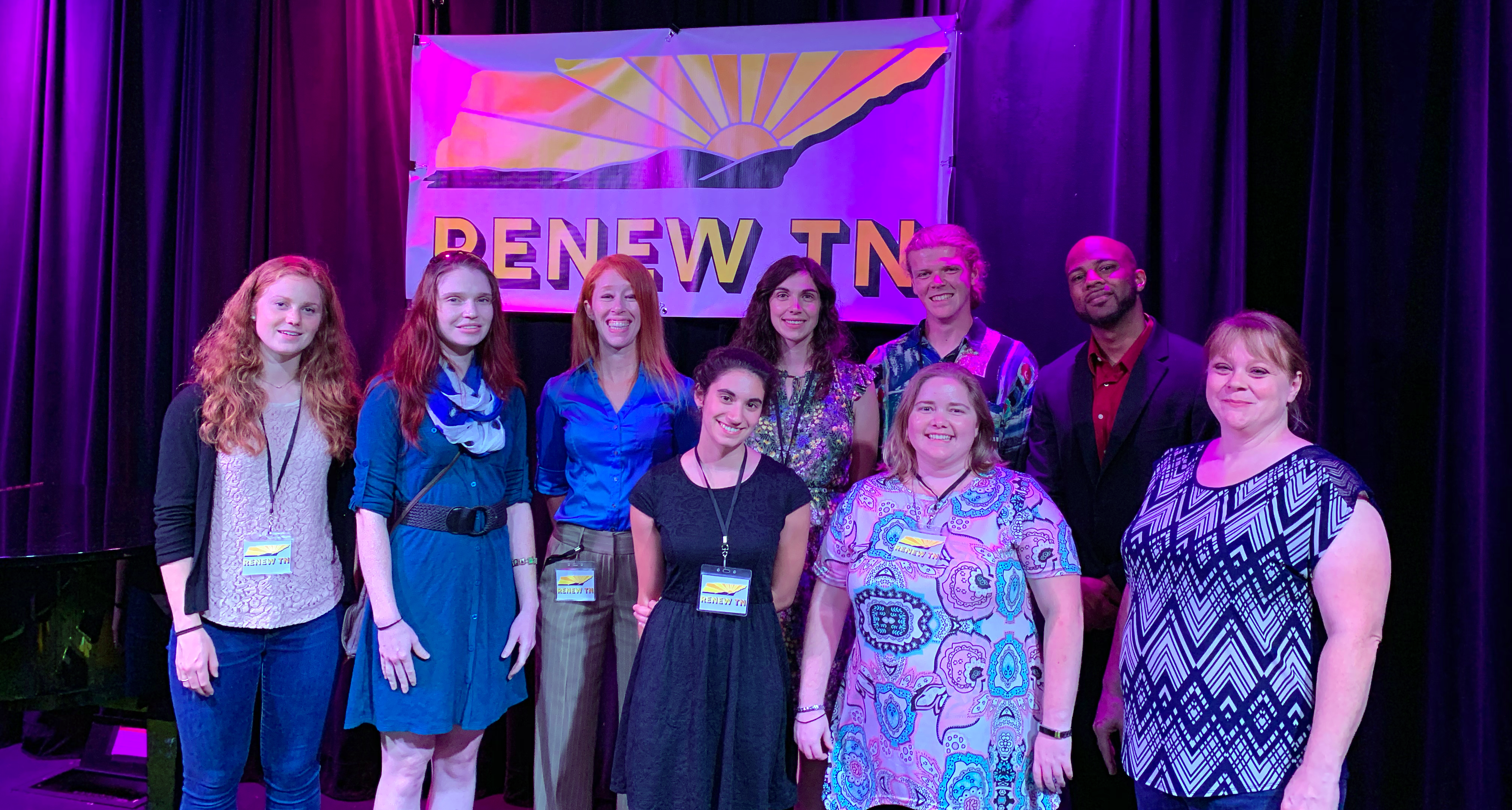
Renew TN in Knoxville and beyond
Monday’s event is the latest in a growing Renew TN campaign that exists not only in Knoxville, but across Tennessee, and would not be possible without volunteers. Following continued increases of mandatory fixed fees on our electric bills and participation at Knoxville Utility Board meetings, over 3,000 Knoxvillians united in February 2019 behind a petition to ask KUB to Freeze the Fees.
Weekly Renew TN Community Meetings are the starting point for those ready to take action and put the “public” back in public power. Join us at our next Renew TN meeting.
So far, Knoxvillians have sent over 650 letters to candidates and elected officials asking them to unite with us around Renew TN values to lower our electric bills; make clean, solar energy accessible for everyone; and ensure transparent, accountable, equitable, and inclusive decisions are being made at TVA and KUB. #RenewTNYear1